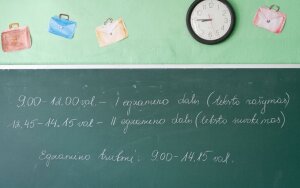- March 29, 2013
- 526
A court verdict regarding concessions in the exam only after the exam. Narkiewicz’s commentary

The decision concerning concessions in the Matura exam in Lithuanian for the pupils from national minorities’ schools will be taken by the Supreme Administrative Court of Lithuania (Lietuvos vyriausiasis administracinis teismas) in the middle of July, that is after the exams.
Minister of Education and Science Dainius Pavalkis is dissatisfied with the ensuing situation.
“Realizing how important this problem is for the young people and the high school graduates, we’ve been asking the court for examining that case as a matter of urgency, however our courts are independent” – Pavalkis commented on the decision of the court.
According to the Minister, the pupils should prepare “not for one or another exam, but for the exam in Lithuanian language”.
The court defeated the motion for examining the case as a matter of urgency. Such decision was supported with argument that the case is particularly complex and there are no precedents in Lithuanian judiciary.
“The examination of the case will begin on 10th June and will end about in the middle of July” – as it was written in the court announcement.
This decision indicates that the directive of the Minister of Education and Science, concerning concessions in the Matura exam in Lithuanian for the pupils from national minorities’ schools, remains valid.
The vice-chairman of Seimas, Jarosław Narkiewicz, described the decision of the court as fair.
“I think it’s a fair decision. Even if, for some reasons, the court will annul the directive of the Minister of Education and Science, such decision will not have an influence on the results of the exam taken with concessions” – said Narkiewicz.
High school graduates from national minorities’ schools will have to write an essay with smaller amount of words than high school graduates from Lithuanian schools: in state exam such essay should consist of 400 to 500 words, whereas in school exam – from 250 to 350 words.
The pupils from non-Lithuanian schools will be permitted also to make more mistakes and to use dictionaries. Moreover, pupils from all schools will be allowed to choose from 3 instead of 7 given authors to literary output of whom the graduates will have to relate in the essay.
Source: http://pl.delfi.lt/aktualia/litwa/tamasuniene-jerzy-to-nie-ezys.d?id=61044139
Tłumaczenie Barbara Rożek w ramach praktyk w Europejskiej Fundacji Praw Człowieka, www.efhr.eu. Translated by Barbara Rożek within the framework of a traineeship programme of the European Foundation of Human Rights, www.efhr.eu.

